Qianling Park
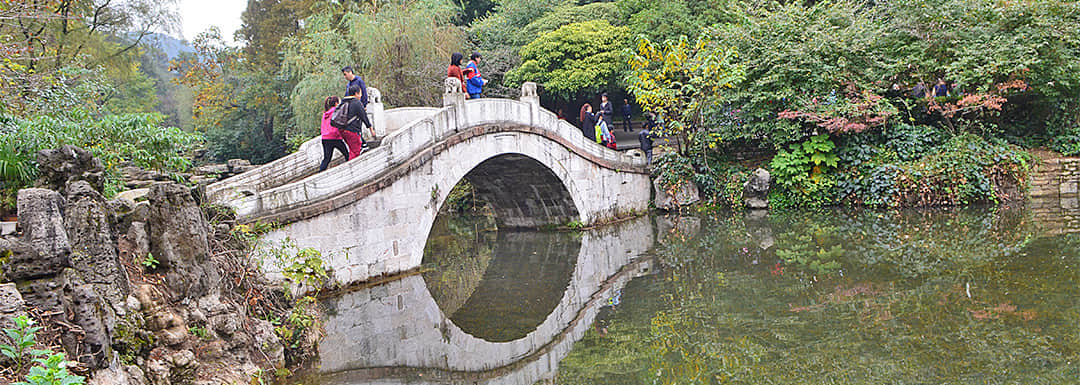
This general park for tourism was built in 1957. The park, in the northwest corner of Guiyang, has the best mountain in southern Guizhou, known as Qianling Mountain. There is a zoo, as well as fountains, strange rocks, monkeys and birds. Remnants of the Quaternary Glaciers can be seen on Qianling Mountain. This famous scenic spot has a complex geological structure and a wide variety of plants. It is a good base for field study.
- Chinese name: 黔灵公园 qián líng gōng yuán
- Estimated visit duration: 4-5 hours
- Ticket: RMB 5 per person
- Address: No. 187, Zaoshan Road, Yunyan District, Guiyang
- Open hours: 6:30 - 22:00
- The best time to visit: from May to November
- How to get there: Take the city bus No. 1, No. 2, No. 10, No. 12, No. 13, No. 16, No. 22, No. 23, No. 25, No. 33, No. 41, No. 46, No. 51, No. 53 or No. 72 or Coach No. 61 or 62 to get there.
Highlights of the Park
Qianling Cave
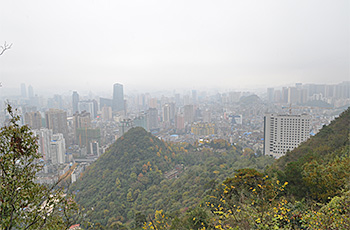
It used to be called Tangshan Cave. It later was renamed for its Qilin (a Chinese unicorn like beast) shaped stalactites. The cave is spacious and can accommodate hundreds of people. A temple used to stand in front of the cave in the late Ming Dynasty. Yang Jin, who was administrating Guizhou, wrote about the cave, “Tangchuan Cave is hidden in the clouds. A lotus blooms quietly in the remote area. When looking around, numerous peaks and heavy forestation are just looming in the mist”.
Qixing (seven stars as in Ursa Minor) Pool
The origin is Tanshan Fountain. The water flows from Qilin Cave to the main entrance of the Park, along which journey seven pools have been formed and they are all named after the 7 stars of Ursa Minor: Yaoguang, Kaiyang, Yuheng, Tianquan. Tianji, Tianxuan, and Tianshu. There are willows and Elephant Fountain near the pools. Lotus blossoms float in the pools and fish swim in the water.
Sanling Bay Macaque Garden
This is part of Sanling Bay Scenic Area. This Chinese and Western style building has conference rooms and guest houses. It was built in the 1930s, and in 1985 the government renovated the construction. Only the conference rooms are preserved. A long corridor that features Chinese Gardens and southeast Pavilions has been constructed to allow visitors to rest and enjoy. In 1991, the only wild macaque garden in the country was established.
Qianling Lake
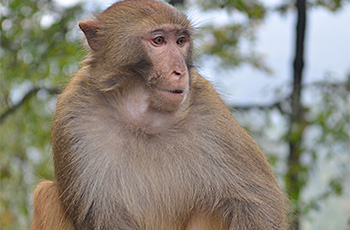
Qianling Lake was formed in 1954 when Daluo Water was enclosed by a dam. The lake area is 28 hectares. In 1999, the municipal government invested a lot to dredge the lake, after which the capacity of the reservoir was greatly increased, the dam was strengthened, and water quality improved. The scenery is perfected with forests surrounding the glistening lake. There are numerous tourist boats on the lake. The water, the mountains, the bridges, and the trees, all add to the Guizhou style scenery.
Hongfu Temple
This is one of the national key open temples, a provincial-level cultural relics protection construction. As the largest Buddhist gathering place for monks in the province, the temple itself is the largest one in Guizhou. The hall of the temple has a grand, elegant structure, with galleries and pavilions being built in many places. Flowers bloom among the tranquil architecture. In autumn, Osmanthus and other plants exude fragrance and display their bright colors. The main buildings include the Fahua Pagoda, Nine-Dragon Wall, Dashan Gate, the Bell and Drum Towers, Avalokitesvara, and Great Buddha Hall.
Drop us a line and we'll connect you with the top China expert in no time!
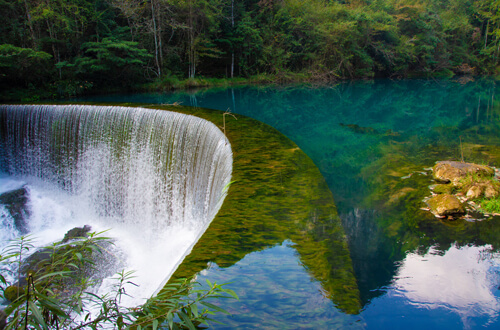 6 Days Guizhou Karst Landscape Tour
6 Days Guizhou Karst Landscape Tour 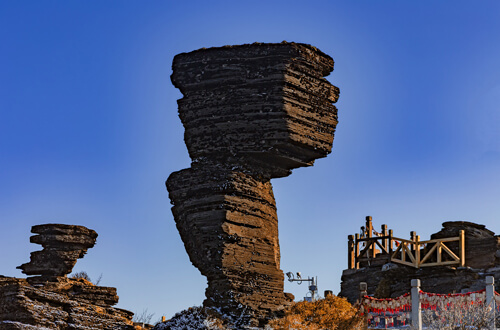 6-Day Guizhou Miao Cultures and Mount Fanjing Tour
6-Day Guizhou Miao Cultures and Mount Fanjing Tour 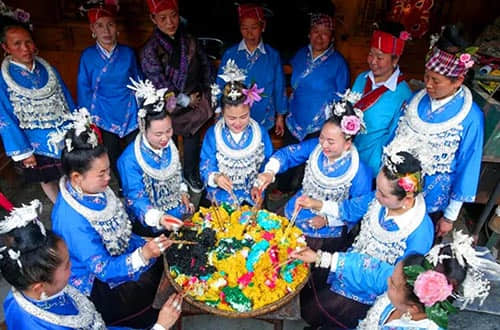 Sisters’ Meal Festival Tour
Sisters’ Meal Festival Tour  Community Service in an Ethnic Minority Village
Community Service in an Ethnic Minority Village